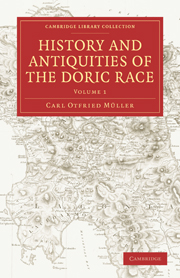Book contents
- Frontmatter
- THE TRANSLATORS' PREFACE
- Contents
- INTRODUCTION
- BOOK I HISTORY OF THE DORIC RACE, FROM THE EARLIEST TIMES TO THE END OF THE PELOPONNESIAN WAR
- BOOK II RELIGION AND MYTHOLOGY OF THE DORIANS
- CHAP. I
- CHAP. II
- CHAP. III
- CHAP. IV
- CHAP. V
- CHAP. VI
- CHAP. VII
- CHAP. VIII
- CHAP. IX
- CHAP. X
- CHAP. XI
- CHAP. XII
- APPENDIX
- ADDITIONS AND CORRECTIONS
- Plate section
CHAP. V
Published online by Cambridge University Press: 05 August 2011
- Frontmatter
- THE TRANSLATORS' PREFACE
- Contents
- INTRODUCTION
- BOOK I HISTORY OF THE DORIC RACE, FROM THE EARLIEST TIMES TO THE END OF THE PELOPONNESIAN WAR
- BOOK II RELIGION AND MYTHOLOGY OF THE DORIANS
- CHAP. I
- CHAP. II
- CHAP. III
- CHAP. IV
- CHAP. V
- CHAP. VI
- CHAP. VII
- CHAP. VIII
- CHAP. IX
- CHAP. X
- CHAP. XI
- CHAP. XII
- APPENDIX
- ADDITIONS AND CORRECTIONS
- Plate section
Summary
On the diversity of Apollo Nomius, and Apollo the father of Æsculapius, from the Doric Apollo. That Apollo was not originally an elementary deity.
1. Having now treated of the extension and propagation of the worship of Apollo, and some of the most remarkable legends and fables connected with it, our attention is next turned to the nature and character of the religion itself.
In the first place, then, we shall remind the reader of a position sufficiently established by the foregoing inquiries; viz. that the Apollo of Tempe, Delphi, Delos, Crete, Lycia, Troy, Athens, and the Peloponnese, is the same god, and not, as was very frequently the case in the religions of Greece, a combination of several deities under one name. This conclusion we supported as well by historical accounts respecting the foundation of his numerous temples, as by memorials of another kind; viz. the recurrence of the same names, rites, and symbols; such, for example, as the titles of Lycius and Lycia, Delphinius and Pythius; the oracles and sibyls; the purifications and expiations; the custom of leaping from rocks; decimations; the golden summer, and bloodless oblations; the laurel-berries; the legend of the Hyperboreans, and the cycle of eight years. Hence the theologians mentioned by Ciceroe were wrong in endeavouring without any authority to make a distinction between the Athenian, Cretan, and Hyperborean Apollo.
- Type
- Chapter
- Information
- History and Antiquities of the Doric Race , pp. 305 - 314Publisher: Cambridge University PressPrint publication year: 2010First published in: 1830



